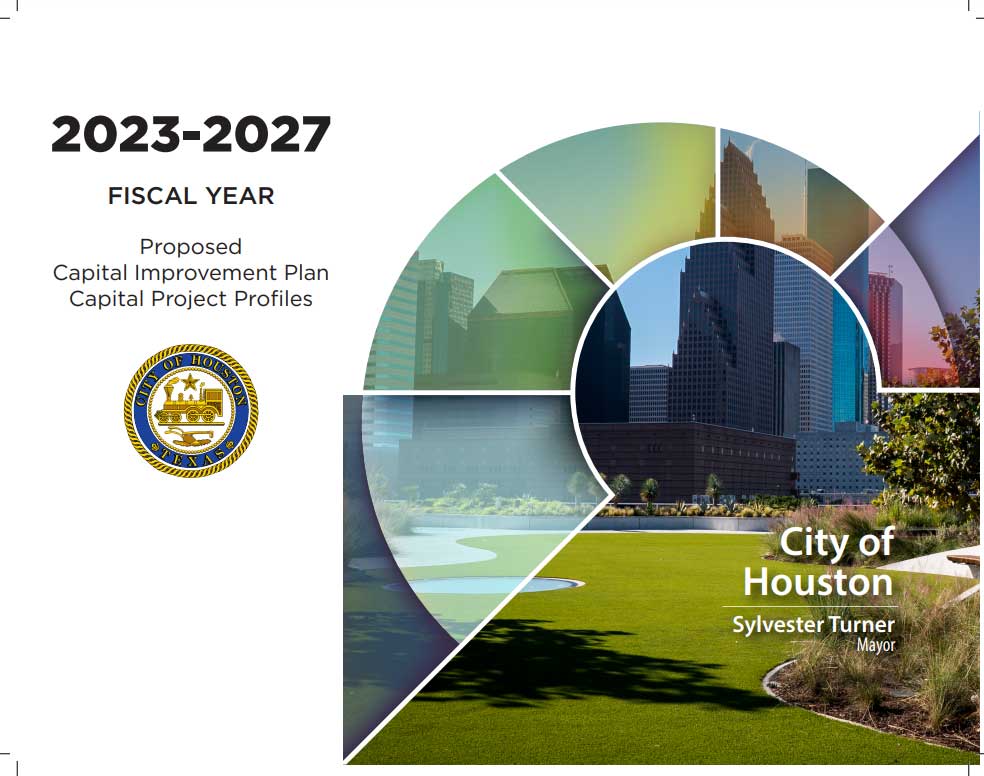The City of Houston faces several key infrastructure challenges, including maintaining and upgrading its transportation infrastructure, improving access to public transit and other transportation options, addressing flood protection issues, ensuring reliable and sustainable water supply and treatment infrastructure, upgrading public facilities such as parks, community centers, and libraries, and managing the impacts of natural disasters such as hurricanes and floods. Additionally, the city must balance the need for infrastructure improvements with the cost of these projects, while also ensuring that residents and businesses have access to safe and reliable infrastructure services that support economic growth and quality of life in the community. The city also faces challenges in providing affordable housing, addressing homelessness, promoting economic development and job growth, and managing growth and development in a sustainable manner, particularly in the face of increasing population and urbanization pressures.

Sample Highlights from the Capital Improvement Plan
Project ID
Project Title
Project Start Year
Project Description
Project Spend Total
Page Ref
Project Satus
437073
Phase 3-Roadway & Utility Reconstruction
2024
“Roadway, public utility and sidewalk reconstruction/replacement,
streetscape/pedestrian amenities using context sensitive design.
Project is located on Bell between Bastrop and Emancipation and
Leeland between St Emanuel and Emancipation.”
5800000
534
Not Started
437165
Greenbriar Drainage System Improvements UPPER KIRBY TIRZ#19
2024
“Improvements include replacement of main trunk line, existing
laterals, and roadway reconstruction on Greenbriar, W. Alabama, Sul
Ross, W. Main, Richmond, and Lexington.”
11910000
561
Not Started
437265
Phase 1 Area-Wide Beautification
2024
“To improve the visual appearance of the area, strategic locations
have been identified for a phase 1 area area-wide beautification.”
510000
592
Not Started
437268
Gateway at Airport Boulevard
2025
“A secondary gateway into the area for visitors traveling along
SH-288 or from the west on Airport Boulevard.”
125000
593
Not Started
437297
Mandell Bikeway
2024
“Create 0.78 miles of new protected bike lanes with green conflict
markings at intersections, with 1.14 miles of improved sidewalks and
44 improved curb ramps.”
1725000
601
Not Started
Explore all options available to you!
Citylitics offers access to over 30,000 unique locations across North America through our Capital Projects Dashboard (CPD).
Capital Projects Dashboard (CPD) provides a comprehensive market view of all planned infrastructure spend in one single view with powerful filters such as: population, project value, fiscal year, project status, project description, geography, and more. The dashboard will help identify opportunity hot spots, create data-driven forecasts you can be confident in with bottom-up data for the next 5 years of planned infrastructure spend, and uncover true market needs.
How to Read a Capital Improvement Plan (CIP) for Business Development?
When a city, municipality or state issues a Capital Improvement Plan (CIP), it can be overwhelming and daunting, but there are a few key things you need to investigate. Let’s start with the definition of CIP – A Capital Improvement Plan (CIP) contains all the individual capital projects, equipment purchases, and major studies for a local government; in conjunction with construction and completion schedules, and in consort with financing plans. The plan provides a working blueprint for sustaining and improving the community’s infrastructures. It coordinates strategic planning, financial capacity, and physical development. A CIP stands at the epicenter of a government’s Planning, Public Works, and Finance departments. When a CIP is issued, it typically includes the following information:
- A listing of the capital projects or equipment to be purchased
- The projects ranked in order of preference
- The plan for financing the projects
- A timetable for the construction or completion of the project
- Justification for the project
- Explanation of expenses for the project
Now, for business development, while the capital plan is interesting, the capital program is for capital expenditures that extends five to ten years beyond the capital budget. Knowing the difference is important so you can influence upcoming program versus just responding to an RFP. If reading the CIP makes your head explode, or you want to save time, Request a Demo of Citylitics CIP dashboard with over 20,000 CIPs from USA and Canada. Citylitics has 20,000 plus available CIPs, how can we help you? What states, cities or counties are you looking to improvement your business development, we can assist you in influencing an upcoming RFP versus simply responding to an RFP. Citylitics Capital Projects Dataset is a comprehensive resource for businesses and organizations looking to track and analyze planned infrastructure spend in their area. The dataset offers a range of features and benefits, including:
- Comprehensive Market View: The dataset provides a single view of all planned infrastructure spend, with powerful filters such as population, project value, fiscal year, project status, project description, geography, and more. This allows businesses to gain a comprehensive understanding of the market and identify new opportunities.
- Identify Opportunity Hot Spots: The dataset offers map views and filters that allow users to identify opportunity hot spots where they need to allocate resources. This helps businesses to understand where they should focus their efforts to achieve the best results.
- Create Data-Driven Forecasts: The dataset provides bottom-up data for the next 5 years of planned infrastructure spend, allowing businesses to create data-driven forecasts they can be confident in.
- Uncover True Market Needs: The dataset allows businesses to develop long-term business plans, R&D, and growth initiatives based on true, bottom-up market needs instead of opinions and anecdotes. This helps businesses to make more informed decisions and achieve better results.
With Citylitics Capital Projects Dataset, businesses can gain a deeper understanding of planned infrastructure spend in their area, which can help them to identify new opportunities and make more informed decisions.
